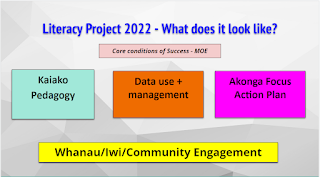Term 2 Review
 |
| English Department 2022 |
Term 2 saw the end of hybrid learning and a return back to a ‘normal’ timetable. It was a full on term for our department with everyone going above and beyond for our akonga. As a team, we continue to do our best as a collective. We are committed to making sure that our students get the best experience in English. We are also committed to ensuring that we are there for each other - if one needs help with behavior management, sharing of units and teaching strategies (just to name a few things), we want to make sure we are supporting each other. Communication is key in any team environment. We hope to continue this going in Term 3, in that we believe this will strengthen what we do both collectively as a team and individually as professionals. Communication and transparency are an important part of building a solid team environment. In Term 2 we have endeavored to make sure that we are doing our best to keep the communication and transparency clear. We have done this through:
- Committing to our weekly meetings (Thursday 8:30am)
- We have met outside of department meetings to review our NCEA Level 1, 2 + 3 assessment schedule.
- We have started to share literacy strategies with each other during our department meetings.
- Professional Growth Cycle - Classroom observations and reflection meetings
- Continue to review NCEA 2024 English standards (get familiar with the new changes to NCEA Level 1)
- Commit to our Literacy goals (developing and sharing new literacy strategies) working with Mr Milford and Dr Jannie
Amber and I are very grateful to work alongside this team. Mrs Harde, Mrs Williams, Mr Hoosein, Ms Latu, Mr Spruyt, Ms Kolo, Mr Milford, Dr Jannie and Ms Jensen - we are grateful and humbled to journey with a team that are dedicated and committed to learning and student well-being.
Term 2: Junior School Review
 |
| Dr Jannie going through the Crafted Writing Program with 9TGu + 9TNi |
Going into Term 3, we would like to see both our staff and students continue working through the literacy journey. We believe that the students gained a lot from the program and even more so, us as teachers were able to learn and upskill at the same time. We will continue to guide our Year 10 students through the Level 1 Assessments that we offer in our Year 10 English program.
Term 2: Senior School Review
*This is subject to change Wk1 Term 3 - pending entries of assessment grades on KAMAR across Level 1, 2 + 3
| Overview of NCEA Level 1, 2 + 3 English Assessment completion for Term 2 |
We are constantly reviewing our data and trying to look for areas of opportunity, to see what happened and what we can do to improve or support student learning outcomes. Going into Term 3, we know that there is a lot of work that needs to be done especially with our Level 3 cohort. How we approach our students who are at risk of achieving is important and before we even start the approach, it is important that we reflect on what we have done and from there figure out what we can do going forward. One of our priorities for Term 3 is to follow up and try and close the gap with our students who have 0 credits across Level 1, 2 and 3. The focus will be to get them through at least ONE internal assessment and prepare them for the external assessments.
Term 3 Plan
Term 3: Junior English Plan
Our focus for the Junior English program Term 3 is to continue our work with Mr Milford and Dr Jannie (Literacy strategies). With the release of the new literacy standards in 2023, we are looking to use time in Term 3 to trial some mock literacy standard assessments with our Year 9 and Year 10 students. We also look forward to using the Manaiakalani Create tools in our planning for our Junior English programs. Below are some things we hope to do with our Junior cohort.
The focus for this term is to finish internal assessments with the students. We will also use time this term to prepare our students for external assessments and the derived grade exams which will take place Week 7 Term 3. The suggested timeline for Term 3 for all senior classes is:
- Year 9 Literacy Booster Group - We are hoping to get this going in Term 3. Dr Jannie started working with our
- Year 9 Crafted Writing Program + Junior School Reading Skills - Continue our work with Dr Jannie + Mr Milford
- Year 10 - Continue working through the Level 1 Assessments - Personal Responses + Connections Essay (to be completed by Term 4)
- Our Voices - Build a collection of work from our Year 9 and Year 10 students (written work) to put towards our Department book ‘Our Voices’.
Term 3: Senior English Plan
- Week 1: Internal Assessment
- Week 2: Internal Assessment
- Week 3: Internal Assessment
- Week 4: Internal Assessment
- Week 5: Prepare for Derived Grade Assessment
- Week 6: Prepare for Derived Grade Assessment
- Week 7: Derived Grade Exam Week
- Week 8: Finish Internal Assessments
- Week 9: Finish Internal Assessments
- Week 10: Finish Internal Assessments
 |
| Term 3 Assessment Schedule for our NCEA Level 1, 2 + 3 students |








